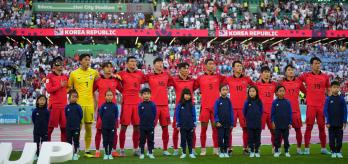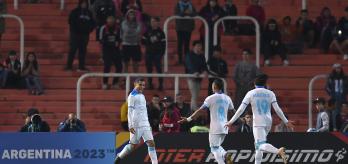Spain is a country with 19 regional football federations. Each region has its own cultural peculiarities and this diversity has an influence on the style of football played and the kind of player that is produced in each region. In what follows, Menchero and Rubio explain some of the unique footballing particularities of their regions, Valencia and Andalucia, and reveal how their organisations feed into the success of Spanish women's football at both the national and international level.
Good practice
-
Increasing human and economic resources to promote and develop football in the regional federations.
-
Mutual cooperation between clubs and the Spanish FA (RFEF), with regional federations acting as facilitator.
-
The regional teams tournament provides a strong recruitment structure, acting as a talent filter which eventually allows national team coaches to watch the biggest concentration of talent in the region.
José Andrés Menchero (Valencia Community Football Federation)
Read Menchero's summary
Part 1: Menchero's footballing journey
In the first part of the interview Menchero looks back on a career in women's football that began over 20 years ago when he began coaching a team of girls in the town where he lived. In 2006, he started working for the Valencian regional federation and went on to manage teams from the U12s to the U18s. In 2018, with the help of a new president, Salva Gomar, a new project was launched which would create a new area, exclusive to women's football. This area, which is called Valenta and translates as "courageous women", includes all of the regional and provincial selections.
Part 2: The "Valentia" Project
In the second part of the interview, Menchero explains that the project is divided into various blocks. The first of these is the sporting block which has increased the number of categories of the sport and now includes 8-a-side football, different children's categories and an amateur category. Within the sporting block there is also the work that goes into selecting the provincial and regional teams, and the work that is carried out across the board in the form of scouting. The next block is related to the development and promotion of women's football which includes an initiative called Valenta visita a tu cole ("Valenta visits your school") where the Federation, with a coach or player, visits school classrooms to recruit players at grassroots level. They also have initiation clinics which clubs can request if they do not have a women's team. Girls can come and sign up and it is another fabulous way of recruiting girls at grassroots level who do not play football yet.
Part 3: Valencian player profile
In the third part, Menchero delves into the characteristics that make up the typical profile of a player from the Valencia region. Although many of their players are of a short to medium stature, they stand out for their talent and technical ability. He explains that Valencia has always had very skilful players who are also fast. He mentions a couple of wingers as examples and then points out that his region also produces good goalkeepers including Sandra Paños, who was part of the winning Spain squad at the FIFA World Cup Australia & New Zealand 2023™.
Part 4: The regional teams tournament
In the final section of the interview, Menchero believes the RFEF's regional championships are one of the most positive things that exist when it comes to monitoring and following players. For Menchero, Spain leads the way when it comes to regional championships of this magnitude, not only in terms of resources and organisation, but also from a financial perspective. The tournament is very important as it helps them to reach the thousands of players that take part across the whole community, detect talent and filter the numbers down to the best 18 in the different age groups.
Meritxell Rubio (Royal Andalusian Football Federation)
Read Rubio's summary
Part 1: Rubio's footballing journey
In the first part of the video, Rubio explains that as head of women's football in the Andalucia Football Federation she looks after not only football, but also futsal and beach football in the region. She started out as a futsal player and, although she studied for a career in law, she decided she still wanted to work in the sport she loved so took her national coaching qualifications. Working her way up, she is delighted to be fulfilling her dreams working in women's football and feels honoured to hold her current directorial role.
Part 2: Structuring and challenges of the regional federation
In the second section of the interview, Rubio explains that as Andalucia is such a large region, it is split into 8 provinces, with one person in charge of each province and Rubio at the head, forming a women's football commission. It is administered centrally in Seville and is very well organised. Rubio talks about how much women's football has grown in recent years and points to the strong structures in place at grassroots level as one of the reasons why it has been so successful. However, she explains that some of the provinces still need work and their structures need to grow to be able to support everything at the top.
Part 3: The success of the regional federations
In the third part of the interview, Rubio explains that in her opinion, the work of the regional federations goes hand in hand with both the work of RFEF and the region's clubs. She believes the regional federations act as a bridge between the two. The federations collaborate with clubs to select the best players and have training sessions where they can work with players and give them technical training. But she points out that without RFEF they cannot give their players that beautiful and attractive image of Spain's national team to aspire to, which is currently so successful.
Part 4: Training, scouting and the regional teams tournament
In the fourth part of the interview Rubio talks about training and scouting. As Andalucia covers such a large area, it is organised within the structure of the 8 provinces that make up the region. Provincial championships are held and this is something different to other regional federations that are more concentrated. Andalucia also has regional training camps where players get together and are judged not only in the field of play, but also how they behave within the group and how well they can problem solve. Players are told the fundamentals about food and nutrition, given physical training and work with psychologists at an individual and group level. Rubio finishes off this section by talking about the positive aspects of the regional teams tournament and believes that all the regional federations need to continue working together so the championships are provided with as much exposure as possible.
Part 5: Andalucian player profile
In the final section of the interview, Rubio describes the player profile typical of Andalucia. She believes that the Andalucian sun brings feelings of joy to her players and this makes them very lively, awake and brazen on the pitch, also mentioning they are great goal scorers. She also believes that Andalucian players' eagerness to socialise together off the field transmits to strong team chemistry on the pitch. Furthermore, they also stand out for their tactical and technical abilities.



















